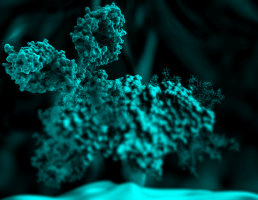
A Phase III clinical trial involving 101 centres in 21 countries revealed the monoclonal antibody blinatumomab to be more effective than standard chemotherapy for treatment of advanced acute lymphoblastic leukaemia (ALL).
Study findings were published online in the New England Journal of Medicine.
The study, led by The University of Texas MD Anderson Cancer Center, randomly assigned 405 patients 18 years or older to groups receiving either blinatumomab or chemotherapy.
Overall survival was significantly longer in the blinatumomab group with median survival of 7.7 months versus four months for those on chemotherapy.
Remission rates within 12 weeks after treatment began were higher in the blinatumomab group with complete remission rates of 34 percent reported in this group versus 16 percent for those on chemotherapy.
The study also showed that patients treated with blinatumomab had a lower rate of adverse effects.
While the prognosis for newly diagnosed ALL has improved over the last three decades with intensive chemotherapy regimens resulting in complete remission rates of 85 to 90 percent and long-term survival rates of 30 to 50 percent, most adult patients with the B-cell precursor ALL, the most common form, ultimately relapse and die from disease complications.
The accepted standard of care is to help the patient maintain remission long enough to receive allogeneic or donor stem-cell transplantation, considered the most effective therapy.
“Among adults with relapsed ALL, remission rates are18 to 44 percent with standard chemotherapy but the duration of remission is typically short. A major goal for these patients is to induce remission with sufficient duration to prepare for stem-cell transplantation,” said Hagop Kantarjian, M.D., chair of the Department of Leukemia, and lead author for the New England Journal of Medicine paper. “In this study, 24 percent of patients in each treatment group underwent allogeneic stem cell transplantation.”
Blinatumomab, developed by Amgen, works by binding simultaneously to specific cytotoxic T-cells and B-cells, which allows the patient’s healthy T-cells to recognise and eliminate cancer stem cells called blasts.
“The activity of an immune-based therapy such as blinatumomab, which depends on functioning T-cells for its activity, provides encouragement that responses may be further enhanced and made durable with additional immune activation strategies,” said Kantarjian.
The World Cancer Declaration recognises that to make major reductions in premature deaths, innovative education and training opportunities for healthcare workers in all disciplines of cancer control need to improve significantly.
ecancer plays a critical part in improving access to education for medical professionals.
Every day we help doctors, nurses, patients and their advocates to further their knowledge and improve the quality of care. Please make a donation to support our ongoing work.
Thank you for your support.